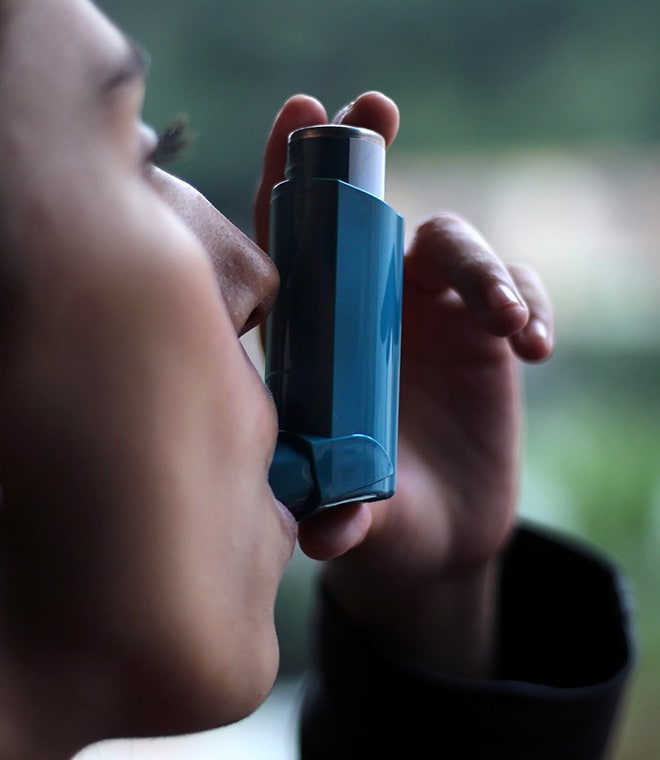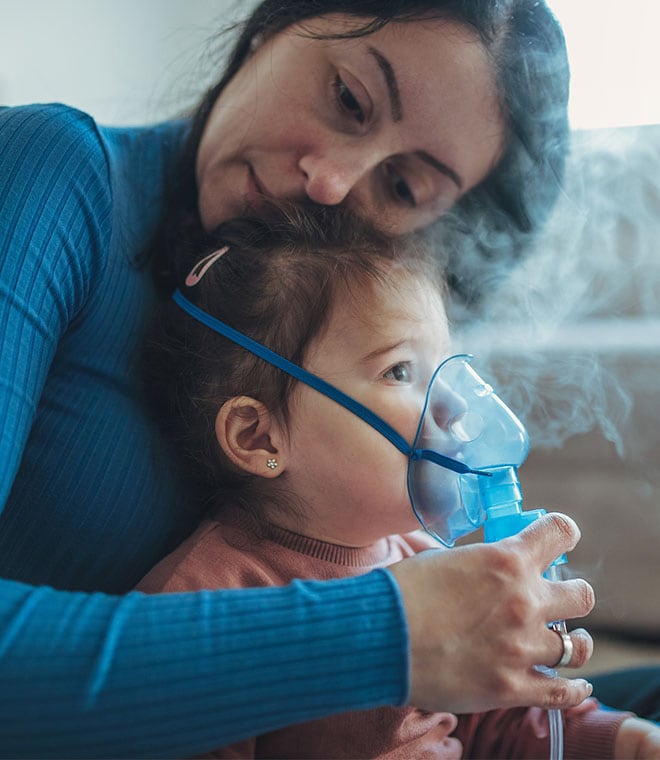Health
Asthma in children: Causes, symptoms and treatment
By Sanjay “Jay” Patel, DO | Allergy & Immunology Jul 07, 2023 • 4 min
Asthma is one of the most common chronic illnesses in children in the U.S., affecting around
7.5 million people under the age of 18. If your child has been diagnosed with asthma, or you believe they’re at risk for developing the condition, understanding what it is, what causes it and how to treat it will help you ensure they get the best possible care.
What is asthma?
Asthma is a chronic lung disease. The lungs are responsible for supplying the body with oxygen, which is absorbed from the air you inhale. The lungs then remove carbon dioxide when you exhale. With each breath, air travels through passages known as airways. In people with asthma, these airways narrow and become easily inflamed.
What causes asthma in children?
Researchers are still working to uncover why some children develop childhood asthma. Although we don’t fully understand the cause, there are some established risk factors that make children more likely to develop asthma, including:
- Genetics: Children with a close relative who has asthma have a higher risk for developing the condition themselves.
- Illnesses: Contracting respiratory illnesses like the flu, the common cold or RSV at a young age increases the risk for childhood asthma.
- Exposure to cigarette smoke: Children are more likely to develop asthma if their mothers smoked while pregnant or if they’re exposed to secondhand cigarette smoke.
- Environment: Childhood asthma is more common in areas with high levels of air pollution.
- Allergies: Children with allergies and/or eczema are at a greater risk for childhood asthma.
- Premature birth: Babies born preterm are more likely to develop childhood asthma, especially if they suffered a lung injury due to prematurity.
In children, asthma symptoms generally occur when something triggers inflammation. Respiratory illnesses, sinus infections, tobacco smoke, chemical fumes, stress, cold weather and exercise are common triggers. Allergic reactions to pollen, pets, dust mites, molds and other allergens can also cause the inflammation that leads to asthma symptoms.
What are the symptoms of asthma in children?
The symptoms of asthma in children vary by age. In infants and toddlers, signs of asthma include:
- Breathing fast
- Nostrils flaring while breathing
- Loud breathing
- Skin sucking in on the chest area with each breath
- Panting while at rest or playing
- Wheezing
- Problems sucking or eating
- Fatigue and listlessness
- Blue discoloration on the tongue or lips
- Nail beds that appear white or gray against dark skin, or blue against light skin
Older children may exhibit some of the same symptoms as younger children. They may also display one or more of the following signs:
- Coughing
- Chest pain
- Chest tightness
- Shortness of breath
- Problems sleeping due to asthma symptoms
- Problems breathing during exercising or having to rest often during physical activity
Children with asthma are at risk for having an asthma attack, a sudden onset of severe symptoms. If your child is struggling to breathe, seek emergency medical attention.
What are the treatments for childhood asthma?
If your child has asthma, their healthcare provider will likely prescribe medications, such as:
- Bronchodilators: Also called rescue medications, these drugs widen the airways, making it easier to breathe. These are inhaled medications administered through an inhaler or a device called a nebulizer. They’re used when a child experiences symptoms.
- Inhaled steroids: These drugs are administered via nebulizer or inhaler and help control inflammation. Typically, healthcare providers prescribe them for regular use to prevent asthma flare-ups.
- Combined inhalers: These medications combine a bronchodilator, an inhaled steroid and sometimes anticholinergics.
- Leukotriene modifiers: These oral medications help fight inflammation to control asthma.
- Biologic medications: These are injectable antibodies prescribed by asthma specialists that are used for severe forms of asthma, especially if other medications do not fully control the child’s asthma.
Giving your child medications as recommended by their healthcare provider is important for managing childhood asthma. In addition, a healthcare provider can help you identify triggers responsible for your child’s symptoms. Taking steps to limit exposure to triggers can help control symptoms.
Will my child outgrow asthma?
Children cannot outgrow asthma. It’s a chronic condition that lasts throughout a person’s life. However, treatment can reduce the severity and frequency of symptoms during adolescence and adulthood.
The first step in addressing asthma is talking to your child’s healthcare provider, who can conduct tests to determine if the symptoms are due to asthma and create a treatment plan to help them feel better.
Updated July 2023.
Sources:
- https://www.health.harvard.edu/blog/a-refresher-on-childhood-asthma-what-families-should-know-and-do-202207122780
- https://acaai.org/asthma/asthma-101/who-gets-asthma/children/
- https://aafa.org/asthma/living-with-asthma/asthma-in-children/
- https://www.chop.edu/conditions-diseases/asthma-in-children
- https://medlineplus.gov/asthmainchildren.html
- https://www.nhlbi.nih.gov/health/asthma/children
- https://www.cdc.gov/vitalsigns/childhood-asthma/index.html
- https://www.mayoclinic.org/diseases-conditions/childhood-asthma/symptoms-causes/syc-20351507
- https://my.clevelandclinic.org/health/diseases/6776-asthma-in-children
- https://www.epa.gov/asthma/do-children-outgrow-asthma



